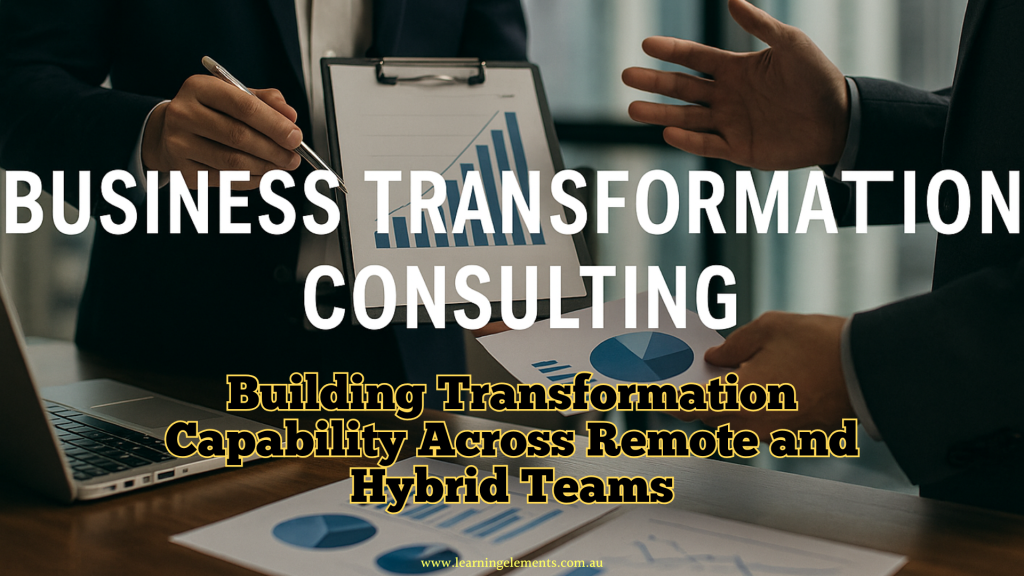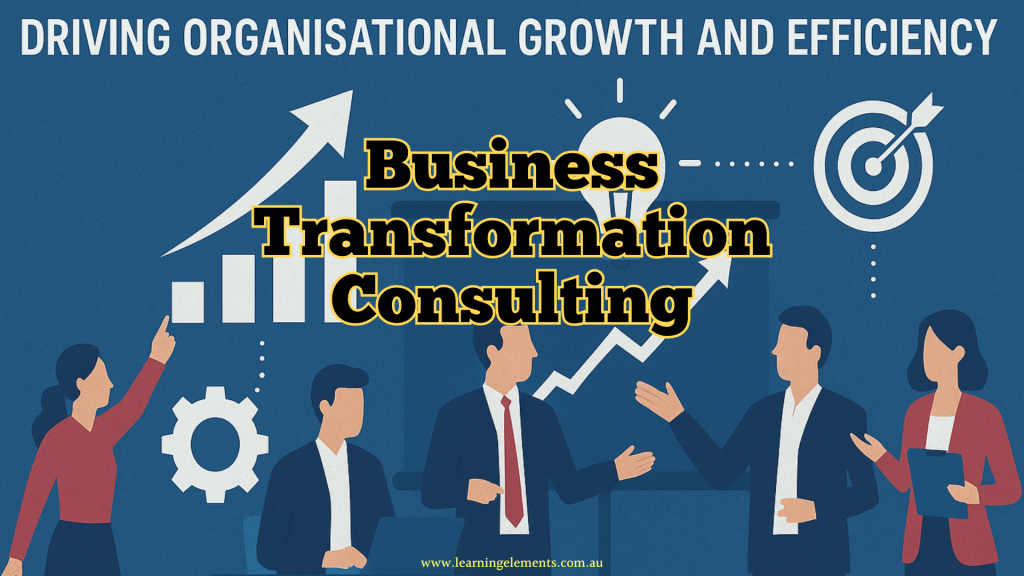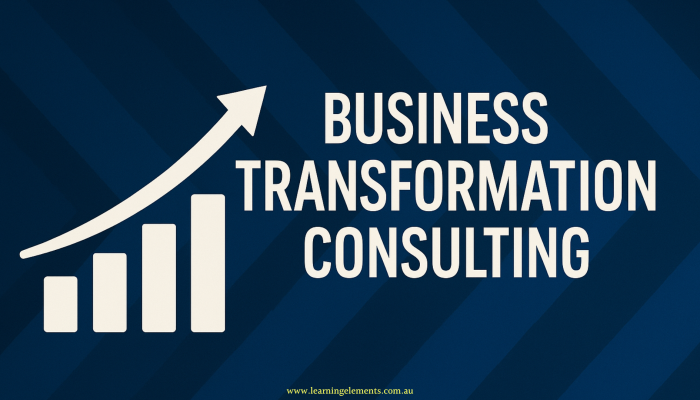Business Transformation Consulting: Driving Organisational Growth and Efficiency
Business transformation consulting helps organisations navigate change, optimise processes, and implement strategies that drive sustainable growth. Whether adapting to market shifts, restructuring operations, or adopting digital solutions, transformation consulting ensures businesses remain competitive and agile.
What is Business Transformation Consulting?
Business Transformation Consulting involves expert guidance to help organisations rethink their business models, streamline operations, and achieve strategic goals. It covers areas such as:
- Operational Efficiency – Improving workflows and eliminating inefficiencies.
- Digital Transformation – Integrating technology for enhanced productivity.
- Strategic Realignment – Reshaping business strategies to meet market demands.
- Workforce Development – Implementing training and coaching for employees.
Key Areas of Business Transformation
1. Organisational Restructuring
Businesses often need to restructure to align with changing objectives, mergers, or market trends. Consulting services help redesign organisational frameworks to ensure efficiency and adaptability. This may involve redefining roles, flattening hierarchies, or centralising key functions to reduce redundancy and improve decision-making speed. A well-executed restructuring not only cuts operational waste but also positions the organisation for sustained growth in dynamic environments.
2. Process Optimisation
Optimising internal processes reduces costs, improves productivity, and enhances overall performance. Business transformation consultants identify gaps and implement best practices to enhance operational workflows. This can include streamlining approvals, automating repetitive tasks, or reengineering outdated procedures. The goal is to create smoother, faster processes that enable teams to focus on higher-value work and strategic objectives.
3. Digital and Technology Adoption
Digital tools and automation are crucial for business success. Consultants assist in selecting and implementing AI-driven solutions, cloud computing, and data analytics to modernise operations. They also evaluate system compatibility, scalability, and integration with existing platforms to ensure long-term value. Strategic adoption of technology can unlock new revenue streams, improve customer experiences, and provide leaders with timely insights to make proactive, data-informed decisions.
4. Workforce and Leadership Development
A strong workforce is key to successful transformation. Through training, coaching, and leadership development, consultants help businesses build a high-performing team ready to embrace change. These efforts often include succession planning, soft skills development, and performance coaching to prepare leaders at all levels. Empowering employees with the right tools and mindset ensures transformation efforts are sustained beyond implementation.
5. Change Management and Culture Shift
Successful transformation goes beyond processes and technology—it requires a shift in mindset. Business transformation consulting includes change management strategies to foster a culture of innovation and adaptability. This may involve change readiness assessments, stakeholder engagement planning, and communication strategies that reduce resistance. A strong cultural foundation helps embed change as a continuous, accepted part of organisational growth.
Upskilling for Change-Ready Teams
A key part of successful transformation is making sure people are prepared. At Learning Elements, we offer targeted training programmes for leaders, managers, and frontline staff — helping teams build the skills needed to adapt, perform, and lead during periods of change.

Building Transformation Capability Across Remote and Hybrid Teams
Remote and hybrid work models add complexity to transformation projects. Effective consulting takes this into account by helping leaders design communication plans, digital workflows, and engagement strategies that work across locations. This ensures that all teams, regardless of location, are aligned, productive, and ready to support change.
Leadership Considerations and Behaviour Alignment
For executives, HR leaders, and department heads across Australia, business transformation is more than a process—it’s a leadership priority. Leaders set the tone and direction for change, so understanding where to focus and how to measure impact is essential to achieving meaningful results.
To drive effective transformation, senior leaders must:
- Invest strategically: Prioritise resources toward people, technology, and change management—not just operational efficiency.
- Make data-informed decisions: Use insights and analytics to respond swiftly to evolving market dynamics or internal shifts.
- Remove barriers to momentum: Identify high-impact areas for change, allocate budgets accordingly, and actively address friction points that slow progress.
Just as importantly, leaders must lead by example—demonstrating commitment, openness to new ways of working, and a focus on measurable outcomes. Leadership behaviour must reflect transformation goals to ensure credibility and inspire adoption across the organisation.
Business transformation consulting supports this alignment by providing coaching, leadership development, and decision-making workshops. These services help senior leaders align their actions with the broader strategic vision, build trust across teams, and accelerate transformation efforts through consistent, visible leadership.
Digital Transformation Strategies for Leaders
Digital change isn’t just about adopting tools—it’s about using them to create measurable improvements. Some core focus areas include:
- Customer Experience: Upgrading digital touchpoints, enabling faster service, and offering personalised support to retain and attract clients.
- ERP and CRM System Upgrades: Moving from fragmented legacy systems to integrated solutions improves decision-making, reduces errors, and simplifies reporting across functions.
- Automation of Manual Tasks: Automating repetitive or time-heavy work frees up teams for higher-value tasks, reduces turnaround times, and increases accuracy.
Technology-Specific Insights in Business Transformation
While adopting digital tools is crucial, the choice of which technologies to implement significantly impacts success. Business transformation consultants often guide organisations in selecting and deploying platforms that support core operations and enable scalability. Common examples include:
- ERP Systems like SAP S/4HANA or Oracle Fusion Cloud ERP, which provide integrated solutions for finance, HR, procurement, and operations. These platforms reduce data silos and improve real-time decision-making.
- CRM Tools such as Salesforce or HubSpot that empower sales and marketing teams with better customer insights and automation.
- AI Use Cases, including:
- Chatbots for customer service automation and lead capture.
- Predictive analytics to forecast sales trends, identify churn risks, or personalise customer experiences.
- AI-based workflow automation (e.g., using UiPath or Power Automate) to reduce manual tasks and increase process speed.
- Integration Tools like Zapier, MuleSoft, or Boomi that ensure seamless data flow between new and legacy systems.
By tailoring technology choices to business needs and readiness levels, organisations avoid overspending and maximise ROI.
How Success Is Measured
Senior leaders typically monitor the effectiveness of transformation efforts using the following indicators:
- Time to implement changes
- Cost and process efficiency improvements
- Employee retention and satisfaction
- Customer feedback or NPS
- Revenue growth post-implementation
- ROI on digital investments
Challenges and Risks in Business Transformation Consulting
Transformation often meets internal friction. Challenges may include:
- Lack of alignment among leaders
- Resistance from employees
- Underinvestment in training and support
- Over-reliance on tech without process readiness
Consulting partners play a key role in anticipating these risks, building internal alignment, and ensuring transformation goals are realistic and achievable.
Risk Management in Business Transformation Projects
Even well-planned transformation initiatives can falter without a clear risk management framework. Beyond technical execution, business transformation consultants address common risks such as:
- Change Fatigue: Teams undergoing constant change can experience burnout and reduced engagement. It’s essential to pace initiatives, communicate early, and celebrate quick wins to maintain morale.
- Contingency Planning: Not all initiatives go as expected. Consultants help define fallback plans, escalation paths, and impact assessments to reduce operational disruption during rollout.
- Governance Structures: Strong governance ensures accountability and alignment. This includes forming a transformation steering committee, assigning project sponsors, and establishing decision rights across departments.
- Underestimation of Cultural Resistance: Change doesn’t just involve systems—it shifts how people work. Failing to address mindset and culture can lead to passive resistance or outright failure. Embedding change champions across teams helps foster ownership.
Effective risk mitigation ensures that transformation initiatives not only launch but also sustain long-term impact.
Practical Problems Solved by Business Transformation
Business transformation initiatives often respond to visible pain points inside the organisation. These include:
- Departments operating in silos with outdated communication practices
- Poor customer experience caused by inconsistent service across regions
- Delays in decision-making due to fragmented or outdated data systems
- Difficulty scaling operations with current tools and workflows
- Inefficient manual tasks that prevent teams from focusing on higher-value work
Consulting support helps pinpoint these gaps and introduces workable solutions that align with both short-term needs and long-term goals.
How Business Transformation Consulting Improves Performance
- Increases Efficiency – Streamlined processes reduce costs and improve productivity.
- Enhances Decision-Making – Data-driven strategies enable better business decisions.
- Boosts Competitive Advantage – Businesses stay ahead by adopting innovative solutions.
- Improves Employee Engagement – Training and upskilling create a motivated workforce.
Transformation strategies are also designed to ensure future scalability and resilience as markets and technologies continue to evolve.
Developing Internal Champions for Long-Term Change
One of the most effective ways to sustain transformation is to identify and equip internal change champions. These are trusted team members trained to support adoption, reinforce new practices, and give feedback to leadership. Business transformation consultants help define these roles and provide the training needed to keep momentum going beyond the project timeline.
Post-Implementation Support and Continuous Improvement
The most successful transformations are those that remain adaptable. Continuous engagement enables organisations to stay agile and refine outcomes in response to shifting priorities or market dynamics. Consulting doesn’t end at implementation—ongoing support helps assess what’s working, identify emerging gaps, and apply targeted improvements. This stage is critical to sustaining progress and ensuring long-term success in an ever-changing business environment.
RELATED READ: Training Gaps and Objectives

FAQs
Here are some common questions business leaders ask when considering transformation consulting:
- What types of organisations benefit most from business transformation consulting?
Any organisation undergoing change—whether expanding, restructuring, or modernising—can benefit. This includes corporates, SMEs, and government agencies. - How long does a typical business transformation project take?
It depends on scope, but projects can range from a few months (for specific initiatives) to 12–18 months for full organisational transformation. - What role do executives and department heads play during transformation?
Leadership involvement is critical. Executives and department heads must drive vision, ensure alignment, and actively support change management efforts. - How do we measure the success of a transformation programme?
Key metrics often include operational cost savings, employee engagement rates, customer satisfaction improvements, process turnaround times, and ROI on technology investments. - How does business transformation consulting handle employee resistance to change?
Consultants use structured change management strategies, communication plans, and training programmes to build trust, minimise resistance, and encourage buy-in across all levels.
Conclusion
Business transformation consulting is essential for organisations that want to remain competitive in fast-moving markets, improve internal efficiency, and drive long-term, sustainable growth. It provides structured support for navigating complex challenges—whether those involve operational inefficiencies, outdated systems, or shifts in workforce capability. For executives and department leaders, transformation isn’t just about change—it’s about making the right changes in the areas that matter most, backed by clear metrics and strong leadership. With targeted strategies and expert guidance, organisations can reduce disruption, build internal capability, and align their operations with future demands.
Learning Elements: Your Partner in Business Transformation
At Learning Elements, we help businesses develop and execute transformation strategies that align with their goals. Our expertise in corporate training, instructional design, and leadership coaching ensures a smooth transition for organisations seeking change.

